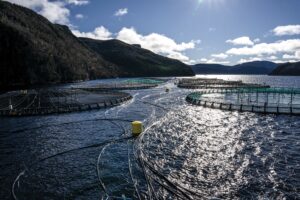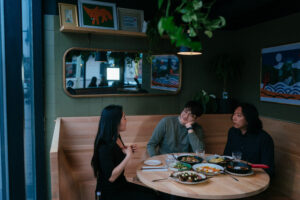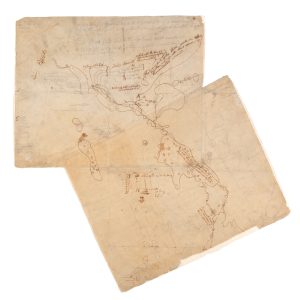
People & Culture
Kahkiihtwaam ee-pee-kiiweehtataahk: Bringing it back home again
The story of how a critically endangered Indigenous language can be saved
- 6310 words
- 26 minutes
This article is over 5 years old and may contain outdated information.
People & Culture

Jonny Harris admits he’s got the best job in the world. The Newfoundlander, who hails from St. John’s, travels to all corners of Canada for his CBC television show Still Standing and visits communities that are full of people sharing laughter with their neighbours, even though they may be facing hardships.
After listening to people’s stories about their hometowns and experiencing the local life, Harris creates stand-up sets for each place he visits — but the comedian is the first to credit the locals he meets for the show’s warmest moments of hilarity. At the end of each visit, he transforms the community hall into a comedy club and offers a toast to Canadians who persevere.
With the fourth season of Still Standing set to premiere on CBC Sept. 18, Harris spoke with Canadian Geographic about small-town spirit, his own understanding of “home,” and what he has learned from the people he has met.
On exploring Canada
In a way, I’m the luckiest tourist in the world because I get to meet a lot of interesting people and get to do a lot of interesting things. For example, not everybody who goes to Carcross, Yukon, has the whole team that built the downhill mountain biking trails show you the best trails and hope that you like it.
There are also things that you learn about the country on a broader spectrum. For the show in Inuvik, I got up onstage and just went, “I’m a long way from home. Despite having travelled in Europe and Central America, I’m further away from home now than I’ve ever been.” I mean, if you drew a line from St. John’s to Inuvik and went in the other direction, you’d be in Africa! Sometimes I think we take it for granted, but Canada really is just so big.
On finding humour in tough situations
I find that people in small towns are proud without being precious. For the most part, they’re pretty laid back and up for having a laugh.
Still Standing has to be a comedy show, but you’re not going to get laughs if you’re hitting issues that are really sensitive for people in an insensitive manner. I think if it comes from a place of empathy and understanding and acknowledgement of the difficulties that a town might have been through or is going through, as long as it’s respectful, people are up for having a night of fun.
For instance, we just came back from Churchill, Man., where the community has lost their train service. It’s been over a year and the town has palpably suffered because of that rail closure.
Churchill was quite unique because the struggle is ongoing. It’s different if you’re talking about the mine that closed down 10 years ago, what it’s been like since, and how a town has tried to diversify or reinvent itself. Many people after the show there said, “That’s just what the town needed.”
We did an episode in Fort McMurray, Alta. [after the fire], and people after the show said, “You know what, it’s about time we had a laugh about that whole thing.”

On finding stories in small towns
Carcross, Yukon is a great story. The Indigenous community there made my job easy. For example, you’ve got these young Indigenous kids who are breaking their backs up on this mountain, building these world-class mountain biking trails, so all I needed to do was give them some credit for that.
An artist that I talked with there, Keith Smarch, didn’t see any Indigenous art when he was growing up there. Now, he’s one of the guys responsible for bringing it back, and you see it on a massive scale. You see this big, bright Pacific Northwest First Nations art all around the community. My job was a little bit easier there because these people were not reeling. Things were turning around for them, culturally. You try to celebrate that a little bit and people will be onside.

I feel like I miss Newfoundland a lot now. I never wanted to consider myself an expat. I moved to Toronto to give it the old college try 12 years ago and figured I’d stay for a couple of years and then move back.
I’ve been lucky because I’ve got a couple of the best jobs a guy in my field could possibly want, but it does keep me away from home. All the episodes that we’ve done in Newfoundland so far I’ve really enjoyed, Fogo Island and Bell Island in particular. I’m looking forward to going back there this year.
There’s a whole other bit of stand-up comedy that I’m going to write some day about moments when I get back to Newfoundland where someone will say something to me and I’ll know I’m truly back in Newfoundland.
The last time that happened, I was on my way to the airport to come back to Toronto and I didn’t have any earphones, so I stopped at Walmart on the way in. I go in, I see a woman working there with a vest on and I go up to her and I say, “Excuse me, can you tell me where electronics is?”
And she says, completely seriously, “My lover, it’s where it always was.”
Are you passionate about Canadian geography?
You can support Canadian Geographic in 3 ways:

People & Culture
The story of how a critically endangered Indigenous language can be saved

Environment
Struggle and success in Atlantic Canada, where aquaculturists strive to overcome climate change and contamination while chasing a sustainable carbon footprint

People & Culture
In honour of Asian Heritage Month, CBC Quebec journalists asked Asian Canadians how they carry their culture

People & Culture
*It means “awake” in Beothuk, the language and people who once called present-day Newfoundland home for about 2,000 years. One young woman, believed to be the last living Beothuk, left a collection of maps and art that help us understand her people’s story.